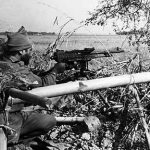THE BATTLE OF CHAMBB, 1971
Episode – 3
[This is the third episode of a series we are featuring through weekly blogs, on the famous battle of Chambb of the 1971 War, as narrated by veterans of the 5th Battalion, the Sikh Regiment, one of the participant units in the battle]
Kaid Ka Sal – The Year in Prison
As I said, we were incarcerated in a dingy cell of a local thana. One day a young Pakistani captain came to see us. We were taken out from the cell and lined up outside. I wondered what new misfortune was about to fall upon us. We were too woebegone to resist anything, hungry, filthy, dirty and beaten up every day; we had been treated shabbily.
This Pakistani captain started smiling at us and said, “Sikh kaum badi chhangi kaum hai – The Sikhs are a very fine race. My battalion is camped close by. When I heard that there are some Sikh prisoners of war in the local thaana, I came to see you. You Sikhs are a fine lot.”
I wondered what sort of mazaak was this. Was this some trick or psychological warfare practice upon us? He told us that his elder brother, who was a Major Saab, had been captured by a Sikh tank risala in Punjab. The Sikhs gave him khaana paani and released him; let him go. So, he had come to say thank you on his brother’s behalf to the Sikhs who spared his brother’s life. Then he left.
We kept discussing the matter amongst ourselves. Some said that he was lying outright. Why will Indian tankmen let go a Pakistani Major Saab? It seemed most far-fetched, what that young Pakistani captain told us. He came to meet us the second day also. He repeated the same story, Sikhs are a very fine race, Sikhs are very brave. Then his eyes brimmed with tears. He said his battalion had received orders for attack and he would never see them again. He left us with tears in his eyes; and we never saw him again. I often wonder what became of that soft spoken Pakistani officer. He was just a nawaan moonda – a raw young man.
After a month, they blindfolded and threw us into trucks and took us away from the thaana. I asked the guard, where were we being taken. The guard said in a low voice, “Oopar waalley sey millane kaa waqt aa gaya – Time has come to meet your maker.” I sat glum and morose. So, this was the end, I thought, the final few moments. Our life was not good, in fact it was a very downtrodden existence; but we living beings are so made that jaan sabko pyaari lagti hai – everybody loves his life even if one is facing great hardships.
We seemed to have been driven a long time before the truck stopped. They raised the flaps of the lorry, took us out and removed our blindfolds. We were in a big compound with long, double-storied barracks on both sides. Beyond the open ground were high walls with watch towers. So, this is where we were to be shot or hanged. The guards’ havildar told us to follow him. We followed him and he took us to a quartermaster store. They issued us a small personal kit before taking us to a long barrack. This was the Sikh line. There were many Sikh men here that included about 35 men of 15 Punjab (Patiala).
They had segregated Indians as per caste and religion. There were also Indian Muslim POWs of the tank risalas, Christians, Hindus, Nagas and Gorkhas. We were responsible for our cooking and we did langar work, cooking and cleaning. Indira Gandhi started sending gifts each month through Red Cross. The gift pack had thirty-five items total like sugar, condensed milk, raisins, shaving ka samaan, kaccha toliya, pajama kurta, chappals, juraab, tooth paste and brushes, saabun, tel wagairah. They also paid us nine rupees per head. We could buy necessities out of the canteen they ran in the prison.
After some time, they made our broadcount (broadcast) when you speak from the radua (radio) station. Me bollya seega – I spoke. “Me Five Sikh daa Darshan Singh Lattala jang lad da lad da capture ho gaya see – I Darshan Singh Lattala of 5 Sikh got captured while fighting. If any of my brothers, sisters, relatives, friends or known persons can hear me, please tell my family know that I am all right.” The camp commandant, Lt Col Mohammad Latif Malik Sahib, was a fine man. A former resident of Malerkotla, he had some affinity to men from East Punjab. He used to come to our makeshift gurudwara to hear kirtan paath that an artilleryman used to do. He even got his wife to sit and listen to kirtan. Whenever the prisoners did some fasaad or vaardaat (unruly behaviour or attempt to escape), he would confiscate rifles of the guards so that the guards don’t shoot any prisoner in a huff and vindictive trigger happiness. “Bandaa oh wadiyaa seega – he was an honurable officer.”
They even organised football matches in prison and I once got a “peeley rang ka toliya – a yellow towel” as prize. We used to get full tummy food. Some of us even used to tuck into “dangar ka meat” on the sly. I don’t remember seeing anyone from the Red Cross or any of our officers there. For one year we saw only the blue sky or the prison surroundings. Then one day the Camp Subedar told us that there would be a durbar. “Benazir Bhutto daa pyoo, kee naa see? Oh daa, aaya see durbar lenn – Benazir Bhutto’s dad, what was his name? He came to take our darbar in Jail.” He started saying that Indian side first said this, then did that, then said this, then did that, but from our side you all are free and can go back to your watan.
The same day they took us to Wagah. First India released some of their POWs, then they released some of ours. Till late night this exchange continued. Giani Zail Singh was there to receive us. He met every person individually, embraced every one of us and presented one set of coat-and-pant cloth and mithai dabba to every Kaidi. In Amritsar, one unit gave us Bada Khana and we boarded train for Delhi. Enroute the train halted at Jaakhal. Here I ran into a boy from our village. He was loitering and chatting with the Kaidis; I recognized him. He took my samaan and went to my village to announce that I had returned. Fifty years ago, there were no telephones, no means of instant communication. In Delhi next morning, Jarnail Mannak Shah – General Manek Shaw, who was “Faujjan Daa Commander – Army Chief” took our Durbar. President V V Giri was also there. Four or five officers and two subedars of 15 Punjab were present as well. Then he said that we were free to go to our homes immediately or through our units as we desired. I went home directly on two months’ leave and after leave reported to our Regimental Centre at Meerut.
As luck would have it, my erstwhile platoon commander at Moel, the quick-footed Naib Subedar Gurdial Singh Saab was now posted to our Regimental Centre. I met him there and he happily took me to his house and looked after me very well. What is there to be said? He was pursued hotly but gave enemy the slip. Who knows, had he stayed back “Ragdaa Jaanda!”
Now these things are only talk, I am an old man but recalling of these incidents, gladdens my heart even today. Many things happen in war and everything cannot be anointed with cold logic.
[To be continued]





